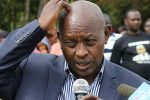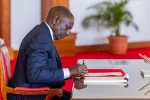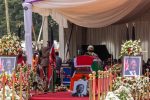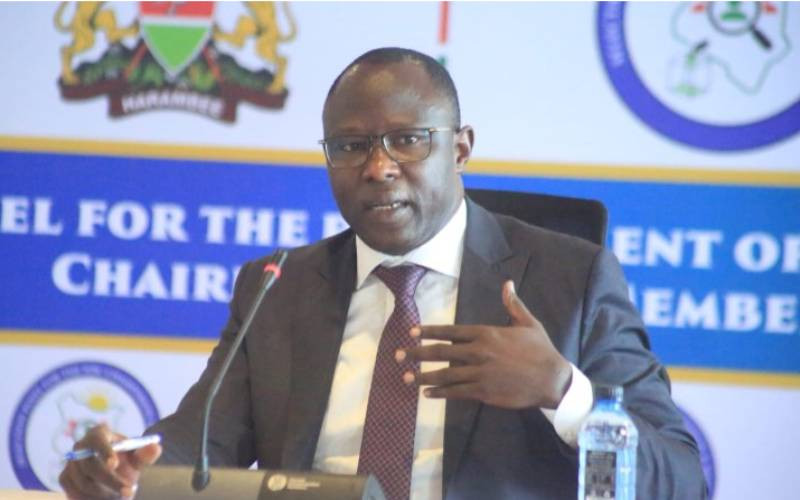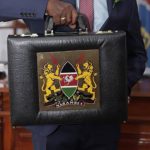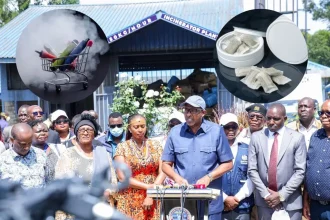On Thursday, President William Ruto nominated Erastus Edung Ethekon as the chairperson of the Independent Electoral and Boundaries Commission (IEBC), a pivotal role tasked with steering Kenya’s electoral processes toward the 2027 General Election.
Edung, a human rights lawyer and governance expert from Turkana, emerges as a figure with a robust legal and public service background, poised to restore public trust in an institution plagued by past controversies.
His nomination, now awaiting National Assembly approval, has sparked both optimism and scrutiny as Kenya navigates a critical juncture in its democratic journey.
Alongside Ethekon, President Ruto nominated six individuals as IEBC commissioners, each bringing diverse expertise to the commission.
The nominees include Ann Njeri Nderitu, the Registrar of Political Parties, known for her experience in electoral administration; Moses Alutalala Mukhwana, a governance specialist; Mary Karen Sorobit, a lawyer with a focus on human rights; Hassan Noor Hassan, former Rift Valley Provincial Commissioner with extensive administrative experience; Francis Aduol, immediate former Vice Chancellor of the Technical University of Kenya, recognised for his academic and leadership credentials; and Fahima Abdallah, a legal expert with a background in public policy.
A Legal and Governance Trailblazer
Edung, aged 48, brings a wealth of experience to the IEBC. A lawyer by training, Edung holds three master’s degrees from prestigious institutions in the United Kingdom and Spain, underscoring his academic rigor and global perspective.
His career spans significant roles in public service and international organisations, reflecting a commitment to legal reform, governance, and marginalised communities.
Edung served as the County Attorney for Turkana, where he navigated complex legal and administrative challenges in one of Kenya’s most underserved regions.
His tenure as a Programme Specialist at the United Nations Development Programme (UNDP) in Kenya further honed his expertise in governance and institutional development.
These roles have equipped him with the skills to manage high-stakes processes, a critical asset for leading the IEBC through by-elections, boundary delimitation, and preparations for 2027.
A Vision for Electoral Reform
During his interviews with the IEBC selection panel in March 2025, Edung articulated a clear vision for the commission. He emphasised restoring integrity and public confidence in the IEBC, particularly by addressing voter apathy and ensuring inclusivity for marginalised groups.
Drawing lessons from the 2022 election fallout, where internal dissent among commissioners fuelled public distrust, Edung proposed governance reforms to allow commissioners to document disagreements internally, avoiding public “political theatrics” that could destabilise the commission.
His focus on transparency, technology-driven result tabulation, and verifiable elections aligns with the demands of a Kenyan electorate wary of electoral manipulation.
Edung’s journey to the IEBC chairmanship was marked by a competitive selection process. From 37 initial applicants, the Nelson Makanda-led panel shortlisted 11 candidates, including heavyweights like former Judiciary Chief Registrar Anne Amadi and ex-Commission for the Implementation of the Constitution Chairperson Charles Nyachae.
By April 2025, sources indicated that Edung, alongside Nyachae, Amadi, and Chief Magistrate Abdulqadir Lorot Ramadhan, was among the top contenders.
His eventual nomination over these seasoned figures suggests a preference for a candidate perceived as independent, youthful, and untainted by past electoral controversies.
Reports suggest that Edung was favoured by opposition leader Raila Odinga’s Orange Democratic Movement (ODM), which saw him as a fresh face capable of delivering impartial leadership.
His Turkana roots also add a layer of regional balance, addressing calls for equitable representation in Kenya’s national institutions.
Edung’s nomination comes at a time when the IEBC faces immense pressure to deliver.
The commission has been without a substantive leadership since January 2023, following the exit of former chairperson Wafula Chebukati and the dismissal of four commissioners who contested the 2022 presidential results.
This leadership vacuum has stalled critical electoral processes, including by-elections in 19 constituencies and boundary delimitation.
If approved, Edung will need to rebuild the IEBC’s institutional framework, recruit senior staff, procure election materials, and enhance voter registration—all under tight timelines.
The shadow of past electoral disputes, coupled with public skepticism, looms large. Critics, including Kathiani MP Robert Mbui, have warned that the IEBC chairmanship is a “career killer,” citing the intense scrutiny and political pressures that have defined the role.
Edung stands at the cusp of a defining moment in Kenya’s democratic history. His legal expertise, governance experience, and commitment to inclusivity position him as a potential catalyst for change within the IEBC.
However, the road ahead is fraught with challenges, from rebuilding public trust to managing logistical and political complexities. As the National Assembly prepares to vet his nomination, all eyes are on Edung to prove he can lead Kenya toward free, fair, and verifiable elections.

